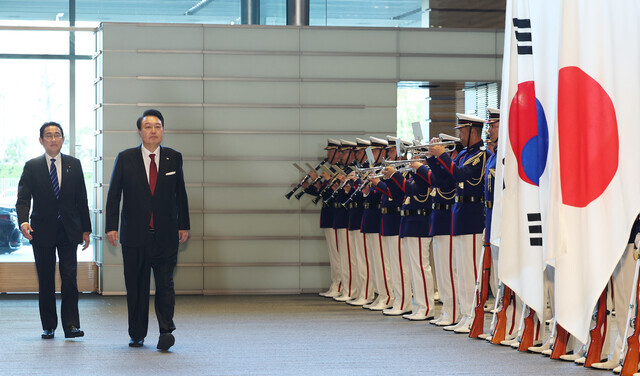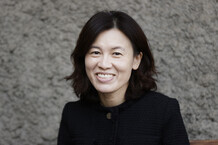hankyoreh
Links to other country sites 다른 나라 사이트 링크
[Column] The dangers underlying Yoon’s “grand giveaway” in Japan


Crushing shame — that’s what I felt when South Korean President Yoon Suk-yeol sought to repackage Japan’s complete victory in Yoon’s summit with Japanese Prime Minister Fumio Kishida as “a future-oriented improvement of Korea-Japan relations.”
With his single remark that his government “inherits previous Cabinets’ perspective on history,” Kishida erased any possibility of Japan expressing remorse.
This wasn’t the “grand bargain” that would settle all of Korea and Japan’s outstanding issues in one fell swoop as Yoon promised — it was a “grand giveaway” in which Korea handed Japan everything it needed.
The world order is weakening as the security situation deteriorates in the North Korean nuclear issue and the crisis in the Taiwan Strait and as the hegemonic rivalry between the US and China intensifies. Under those circumstances, I think that Korea needs to cooperate with Japan.
But what chance is there for fair and reliable cooperation between our two countries when that cooperation is based on the flimsy foundation of a humiliating foreign policy that lets down the Korean public as Japan looks down its nose at Korea to make sure it keeps its promises?
Why must Yoon charge ahead so impetuously? The answer is that he’s clueless about the sensitivity of Korea-Japan relations and the significance of history.
Officials report that Yoon’s advisors kept insisting that Japan should be expected to at least offer an apology, but Yoon ignored their advice, which he’s convinced represents an outdated attitude toward Korea-Japan relations. The Korean president is trying to create a country that no longer demands an apology from Japan — exactly what the Japanese right wing has long desired.
Another factor is Yoon’s nervous assumption that Korea can’t move forward with the US until it settles its outstanding historical disputes with Japan. Yoon’s foreign policy seems to be based on the belief that cooperation among Seoul, Washington and Tokyo on military matters and economic security is key to the US’ strategy of containing China and that South Korea will be left behind if it doesn’t take part in that.
“President Yoon keeps making radically provocative moves based on his assumption that Korea’s very survival will be endangered if it falls outside of the US’ sphere of influence,” said Kim Heung-kyu, a professor at Ajou University, during a seminar organized by the Northeast Asia Research Foundation on Tuesday.
“If he keeps this up, China will use the same tactics employed by Japan to bring Korea to heel,” Kim warned.
In addition, Yoon’s self-aggrandizing approach to foreign policy has gotten worse.
This visit to Japan is a steppingstone toward his state visit to the US on April 26. The presidential office and the Ministry of Foreign Affairs have been striving since January to schedule a date for the Korea-US summit and to arrange for Yoon to deliver an address before a joint session of Congress.
Yoon dreams of the day when he will stand before Congress as a “leader of the free world” to celebrate the 70th anniversary of Korea’s alliance with the US.
Yoon has also been angling for an invitation to the G7 summit that will be held in Hiroshima in May. Given the need to orchestrate these “historic scenes” that will be a big hit with his base, Yoon didn’t have time to properly negotiate Korea-Japan relations.
As Korea’s foreign policy has tilted toward the president’s personal interests, the urgent issues that will actually determine Korea’s future have been shunted to the side.
Last October, the US imposed restrictions on exporting semiconductors to China, and on Feb. 28, it announced rigorous requirements for companies that wish to receive subsidies for building chip plants in the US: They will have to hand over business secrets and commit to not expanding factories in China for the next decade.
Korea’s trade minister didn’t visit the US to deliberate these matters until the date of Yoon’s trip to the US was confirmed on March 7.
US government officials and lawmakers are reportedly surprised at how uninterested the Korean government seems to be about semiconductors and batteries. They’re bemused that the Korean government hasn’t been more aggressive when a strong push could well force compromise.
Both the US and China have been openly pursuing the protectionist course of finding a domestic supply of key strategic materials. That’s a course of action that major US allies such as Europe and Japan are loath to tolerate.
While sharply criticizing the US’ protectionist behavior, the EU is drafting the Critical Raw Materials Act, which will require companies receiving subsidies to source critical raw materials and parts from inside Europe.
While Japan is sticking close to the US, it’s busily trying to secure the role of architect of the new order. Japan is making a determined effort to reclaim its status in the semiconductor industry — one that it believes was stolen by South Korea and Taiwan in the wake of a semiconductor agreement that Japan reached with the US in 1986.
Korea is the world’s fifth-largest manufacturer and one of the top two producers of semiconductors and batteries, with a big military and defense industry. Both the US and Japan desperately need Korea’s cooperation to achieve their strategic goals of curbing China and reorganizing high-tech supply chains.
To ensure a future for the nation, Korea needs to maximize its leverage by standing up to its allies and applying itself to negotiations to ensure it’s not getting ripped off.
But Yoon is defying the principles of diplomatic negotiations and weakening our capability to haggle with his delusional view that other countries will be nice to us if we grovel before them. Taking a future-oriented stance when the other side is not is a major mistake that will have a harmful impact on our future.
Please direct questions or comments to [english@hani.co.kr]

Editorial・opinion
![[Column] Season 2 of special prosecutor probe may be coming to Korea soon [Column] Season 2 of special prosecutor probe may be coming to Korea soon](https://flexible.img.hani.co.kr/flexible/normal/500/300/imgdb/original/2024/0426/3317141030699447.jpg) [Column] Season 2 of special prosecutor probe may be coming to Korea soon
[Column] Season 2 of special prosecutor probe may be coming to Korea soon![[Column] Park Geun-hye déjà vu in Yoon Suk-yeol [Column] Park Geun-hye déjà vu in Yoon Suk-yeol](https://flexible.img.hani.co.kr/flexible/normal/500/300/imgdb/original/2024/0424/651713945113788.jpg) [Column] Park Geun-hye déjà vu in Yoon Suk-yeol
[Column] Park Geun-hye déjà vu in Yoon Suk-yeol- [Editorial] New weight of N. Korea’s nuclear threats makes dialogue all the more urgent
- [Guest essay] The real reason Korea’s new right wants to dub Rhee a founding father
- [Column] ‘Choson’: Is it time we start referring to N. Korea in its own terms?
- [Editorial] Japan’s rewriting of history with Korea has gone too far
- [Column] The president’s questionable capacity for dialogue
- [Column] Are chaebol firms just pizza pies for families to divvy up as they please?
- [Column] Has Korea, too, crossed the Rubicon on China?
- [Correspondent’s column] In Japan’s alliance with US, echoes of its past alliances with UK
Most viewed articles
- 1No good, very bad game for Korea puts it out of Olympics for first time since 1988
- 2Division commander ordered troops to enter raging flood waters before Marine died, survivor says
- 3Korea’s 1.3% growth in Q1 signals ‘textbook’ return to growth, says government
- 4Will NewJeans end up collateral damage in internal feud at K-pop juggernaut Hybe?
- 5[Column] Season 2 of special prosecutor probe may be coming to Korea soon
- 6[Editorial] Korea’s surprise Q1 growth requires objective assessment, not blind fanfare
- 7[Column] ‘Choson’: Is it time we start referring to N. Korea in its own terms?
- 8‘We must say no’: Seoul defense chief on Korean, USFK involvement in hypothetical Taiwan crisis
- 9Korea sees more deaths than births for 52nd consecutive month in February
- 10Is N. Korea threatening to test nukes in response to possible new US-led sanctions body?